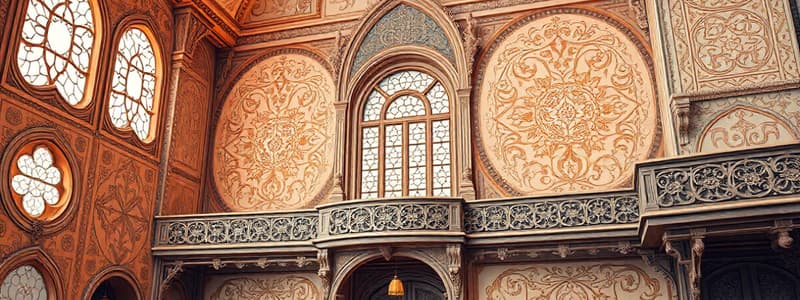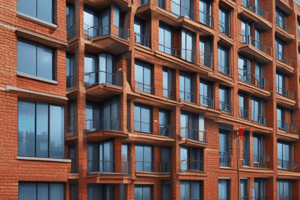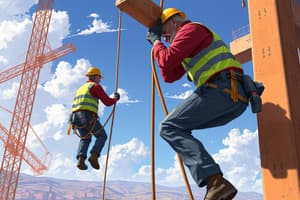Podcast
Questions and Answers
At what temperatures do galvanized steel studs typically melt?
At what temperatures do galvanized steel studs typically melt?
- 2,400° to 2,500°F
- 2,800° to 3,000°F
- 2,600° to 2,700°F (correct)
- 2,000° to 2,200°F
Which of the following materials is not considered noncombustible?
Which of the following materials is not considered noncombustible?
- Plaster
- Concrete
- Wood (correct)
- Backer board
What measure can help maintain fire ratings in metal stud walls?
What measure can help maintain fire ratings in metal stud walls?
- Installing thicker drywall
- Caulking between the ceiling/top track and floor/bottom track (correct)
- Using noncombustible paints
- Using only steel studs
What does the Gypsum Association define as noncombustible materials?
What does the Gypsum Association define as noncombustible materials?
In fire protection design, what is a practical approach towards achieving fire safety?
In fire protection design, what is a practical approach towards achieving fire safety?
Flashcards
Fire Resistance
Fire Resistance
The ability of a material to resist fire and prevent its spread. This includes factors like the material's combustibility and flame-spread rating.
Type I and II Buildings
Type I and II Buildings
These building types are designed to withstand fire for longer durations and have more stringent fire protection requirements. They often use non-combustible materials.
Noncombustible Materials
Noncombustible Materials
Materials that do not readily ignite or contribute to the spread of fire, as defined by building standards. This doesn't necessarily mean they are completely immune to heat damage.
Flame Spread Rating
Flame Spread Rating
Signup and view all the flashcards
Sound-Deadening Gypsum Wallboard
Sound-Deadening Gypsum Wallboard
Signup and view all the flashcards
Study Notes
Fire Protection Requirements
- Drywall installers must know potential sound leakage locations.
- Openings (pipes, ducts, electrical outlets) can cause sound leaks.
- Fire tests show steel studs melt between 2,600° and 2,700°F.
- Metal-stud partitions can meet sound and fire resistance standards.
- Gypsum wallboard increases sound and fire resistance.
- Caulking between ceiling/floor and track prevents leaks.
No Combustibility
- Most building codes require noncombustible materials, especially in Type I and II buildings.
- Several definitions describe noncombustibility.
- Gypsum Association's definition: material falling into one of three groups (a-c) in its used form. Surface finishes and clearances to appliances and flues are not considered.
- Materials may not increase combustibility or flame spread rating over time, due to moisture, age or other conditions.
Studying That Suits You
Use AI to generate personalized quizzes and flashcards to suit your learning preferences.




